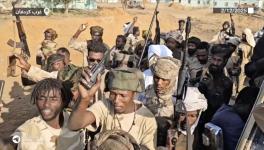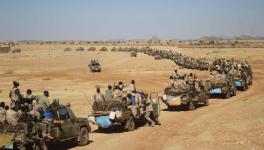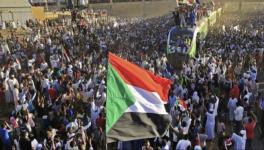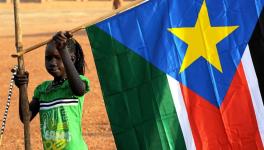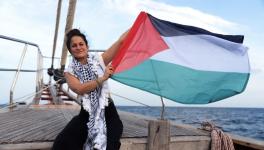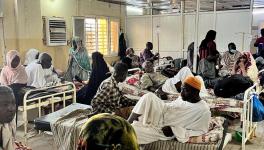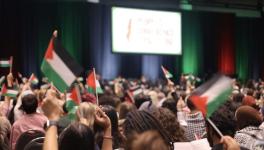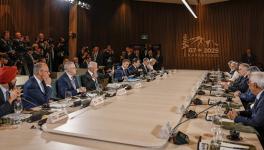Six Months After Khartoum Massacre, Justice Remains Elusive
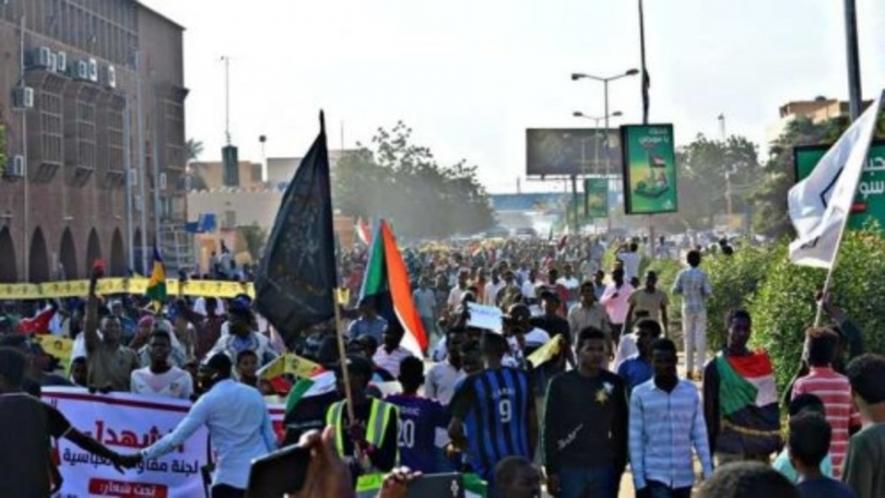
Thousands of protesters demanded that the Khartoum massacre of December 3 be treated as a crime against humanity.
December 3 marked six months since the horrific massacre of Khartoum in Sudan in which over 120 protesters were brutally killed by a militia associated with the ruling junta. A transitional government is now in power with civilian representation but the families of victims have not received justice yet. On December 4, thousands of Sudanese marched to demand the prosecution of those responsible for the massacre. Their demand is that the massacre be treated as a crime against humanity.
The protests took place in Khartoum, Khartoum North and the neighboring city of Omdurman. Demonstrating under the banner of the “Families of Revolution’s Martyrs”, protesters waved the national flag and many held pictures of those martyred that day. In Khartoum, the rally began from the house of one of the victims and proceeded towards the site of the massacre.
Resistance committees were organized at the neighborhood level with the backing of the Sudanese Communist Party (SCP) and the Sudanese Professionals Association (SPA), which had spearheaded the Sudanese revolution in December 2018.
The protesters expressed dissatisfaction with the investigative committee set up by the transitional government. This government includes members of the former military junta, who share power with civilians chosen by the Declaration of Freedom and Change Forces (DFCF). The DFCF is a coalition of left and centrist opposition parties representing the protest movement that led to the ouster of Omar al-Bashir as the Sudanese president in April 2019. The DFCF then continued its agitations to force the military junta which had subsequently assumed authority, to cede power to a transitional government.
The transitional government was formed in August 2018. All the ministers in the cabinet were chosen by the DFCF except those of defense and home affairs who were chosen by the army and the police. However, the sovereignty council, which is the highest body of the transitional government, has an equal number of members appointed by the DFCF and the former military junta.
The prime minister – also chosen by the DFCF – announced the formation of a committee to investigate the June 3 massacre in September, and appointed its members by the end of October. However, protesters demand that a new investigative committee be established, which includes representatives of the families of the victims. They also want a special court headed by the Chief Justice to try those accused of perpetrating and planning, not only the massacre on June 3, but all the killings of protesters in the course of the Sudanese revolution.
Sudan Tribune reported that the police and army barricaded the protest rally on Wednesday and prevented them from reaching the presidential palace and the cabinet premises. A memorandum of demands was, however, handed over to the cabinet, the sovereignty council and the judiciary.
Conflict of interest
The sovereignty council is headed by the country’s president. For the first 21 of the 39 month-long transitional period, this office is being held by general Abdel Fattah al-Burhan, who also headed the military junta. He has been repeatedly accused by the families of the victims as the one who ordered the massacre.
Among those also appointed to the sovereignty council by the military junta is its vice-president, general Mohamed Hamdan Dagalo, who also headed the Rapid Support Forces (RSF) which perpetrated the June 3 massacre. The RSF is a militia which is not part of the country’s regular armed forces, but is composed of the Janjaweed fighters used by the erstwhile al-Bashir regime to commit the genocide in Darfur.
On June 3, the RSF militiamen, after blocking all exits, opened multiple rounds of machine gun fire at protesters, who were part of a sit-in demonstration outside the military headquarters in Khartoum. In the indiscriminate violence that ensued, over 120 were killed and at least 700 left wounded. The injured were attacked even inside the hospitals. In fact, many of the hospitals were blocked by the RSF to deny treatment to the victims of the massacre.
Several bodies were also recovered a day later, of those who had been hacked to death with machetes and dumped in the Nile with rocks tied to their feet. Dozens of women and young boys and girls were raped.
The months-long sit-in demonstration was thus dispersed. The RSF patrolled the streets for over a week, terrorizing anyone who dared to venture out in this period. The residents of the capital were virtually held under mass-house arrest.
In a report last month, Human Rights Watch (HRW) stated that it had “documented reports of racial slurs, insults, head-shaving, sexual assaults, gang rape, and urination on protesters” during this period, “indicating intentional infliction of physical harm and humiliation”.
However, in spite of the atrocities, the protest movement regained momentum within weeks, and eventually the military junta had to make way for a civilian-dominated transitional government.
Yet, due to the compromises made by the centrist parties in the DFCF, in the face of a stalemate in the negotiations with the junta, the agreement which made way for the transitional government ensured that the junta shared equal power in the sovereignty council.
While Dagalo has maintained his denial of the allegations against him, there are inconsistencies in his claims. Initially after the massacre, on many occasions, he claimed that the RSF was ordered only to clear “Colombia” – an area along the Nile near the sit-in demonstration. This was known to be a permissive space where youngsters and soldiers went to consume alcohol or hashish. The general defended himself by saying that the militiamen had exceeded their orders when they cleared the sit-in demonstration beyond this area.
Later in July, when the protest movement had regained momentum, Dagalo went on to deny any involvement by the RSF. “Any man”, he said, “can say that he is from the RSF. The khaki of the RSF.. is already available in the markets…Those [who committed the massacre] are not from the RSF,” he claimed. However, only a month later, he reiterated his previous defense.
However, the allegations against the junta have been compounded by the HRW report, which is based on “field research in Khartoum between July 28 and August 11, and interviews with more than 60 people in Khartoum and Omdurman including families of those killed, activists, staff of civil society organizations, and medical service providers.”
“There is circumstantial evidence that the attack on June 3 was planned,” the report claimed. “On June 3, the number of forces deployed in the operation against the sit-in – estimated in the thousands – suggests official operational planning.”
Immunity for key suspects
Despite the mounting evidence against Dagalo and the junta, he remains as a member of the highest body in the transitional government which has instituted the investigative committee. In fact, all members of the sovereignty council have already been accorded immunity under the power-sharing agreement by which the transitional government has been formed.
This immunity can only be removed by the legislative council, which was to be formed within 90 days of the formation of the sovereignty council. 67% of the members of the legislative council will be appointed by the DFCF, and the remaining 33% of the seats will be shared by other political parties excluding those who were a part of the ousted Bashir’s regime.
As per schedule, this body was to be formed by November 20. However, under pressure from the military members of the sovereignty council, the transitional government has been dragging its feet on the matter. It has argued that the body can only be formed after the completion of negotiations with armed rebels, and with the establishment of peace.
Meanwhile, the peace talks which had been ongoing in Juba, the capital city of South Sudan, are set to resume on December 10. Ahead of this, in a gesture of goodwill, a delegation from the Agar faction of Sudan People’s Liberation Movement-North (SPLM-N) visited Khartoum on December 2.
“We came to preach peace [and].. create a new partnership with the Transitional Authority represented by the Sovereign Council and the Council of Ministers,” said deputy chairman Yasir Aram.
Get the latest reports & analysis with people's perspective on Protests, movements & deep analytical videos, discussions of the current affairs in your Telegram app. Subscribe to NewsClick's Telegram channel & get Real-Time updates on stories, as they get published on our website.









